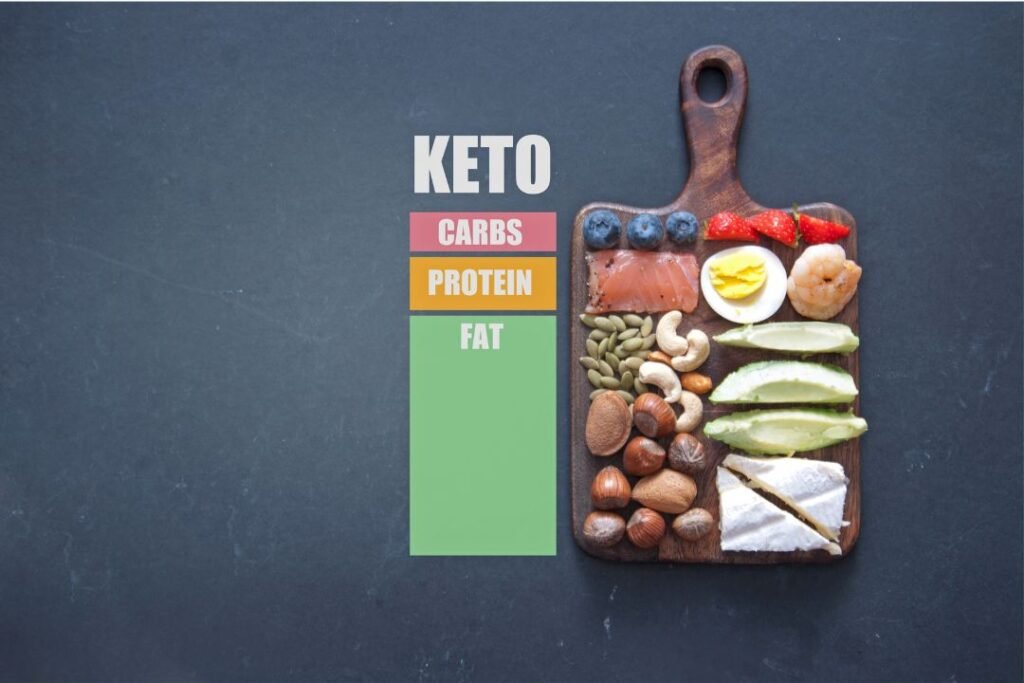
Optimize Your Health with Lifestyle Keto
Lifestyle keto, in recent years, the “keto” or ketogenic diet has gained popularity as a means of weight loss and health enhancement. Low-carb, high-fat eating is the foundation of the ketogenic lifestyle, which goes beyond a diet. Beyond only helping you lose weight, a ketogenic lifestyle can improve your entire health and prevent disease in addition to giving you consistent energy and mental clarity.

Table of Contents
What is the state of ketosis?
The goal of the ketogenic diet is to induce ketosis, a state of altered metabolism. At this point, the body begins to use fats and ketones as its primary energy sources rather than carbs.
When there are few accessible carbs, ketosis sets in. For usage as fuel, the liver starts to break down stored fat into fatty acids and ketone molecules. When glucose levels are low, ketones can pass through the blood-brain barrier and give the brain energy.
Fast weight reduction, reduced appetite, sharper focus and concentration, and a “fruity”-smelling breath are indicators that you have entered ketosis. As ketosis supplies the body and brain with long-lasting energy, it also aids in hunger suppression.

Advantages Not Just for Losing Weight
While rapid weight loss is the most well-known advantage of the ketogenic diet, there are numerous additional advantages as well. Among the many advantages of being in ketosis are the following:
Constant energy – Unlike carbs, which cause energy spikes and decreases, ketones give the body and brain a consistent flow of fuel. Many people who follow a ketogenic diet report having constant attention, energy, and mental clarity.
Blood sugar regulation: For people with diabetes or prediabetes, ketosis can assist in maintaining stable blood sugar levels. The body uses less insulin to control blood sugar while it is in ketosis.
Neuroprotective effects: By supplying ketones to power the brain, a ketogenic diet may help people with Parkinson’s, Alzheimer’s, and other neurological illnesses. This is based on preliminary research.
Decreased inflammation: It seems that ketosis reduces the body’s chronic inflammation, which is connected to a number of illnesses. Those on a ketogenic diet show a considerable reduction in inflammation markers.
Better heart health: High blood pressure and raised LDL cholesterol are two risk factors for heart disease that ketosis may help lower.
Not Just Keto Dieting
There is more to leading a ketogenic lifestyle than merely eating a high-fat, low-carb diet. These pointers can help you adopt a sustainable ketogenic lifestyle:
Drink plenty of water and electrolyte-rich liquids, such as bone broth, to stay hydrated and prevent the symptoms of the keto flu. Drinking enough water is essential when limiting carbs.
Boost your intake of good fats by consuming a lot of fatty fish, avocado, nuts, seeds, olive oil, and avocado. Good fats provide flavor and keep you feeling full.
Select low-carb vegetables: Asparagus, leafy greens, broccoli, cauliflower, and zucchini are excellent low-carb side dishes.
Increase intermittent fasting: Letting go of food for longer periods of time quickens the ketosis process. Consider attempting a 16–24 hour fast one or two days each week.
Exercise: Get regular exercise to help burn fat that has been stored and to boost energy. Put strength training first if you want to gain muscle.
Handle stress: Take care of your mental well-being with yoga, meditation, massages, and sound sleep habits. Stress levels might have an adverse effect on the hormones required for fat burning.
Supplement if necessary: When necessary, MCT oil, electrolytes, and exogenous ketones can help you enter and maintain ketosis. Consult your healthcare professional.

Delicious Keto-Friendly Foods
Eating rich, filling, high-fat foods is one of the best aspects of the ketogenic lifestyle. The keto diet doesn’t have to feel restrictive if you put a little imagination into it.
You may base your tasty, high-fat, low-carb meals on these delectable keto-approved foods:
Meat: Tender cuts such as lamb, ribeye, and brisket.
Poultry includes skin-on chicken, turkey, and duck.
Fish: trout, sardines, tuna, mackerel, and salmon.
Eggs: Any style prepared.
Dairy products include simple Greek yogurt, full-fat milk, butter, cream, and cheese.
Nuts and seeds: pecans, walnuts, chia seeds, pumpkin seeds, and almonds.
Vegetables that are not starchy: broccoli, tomatoes, peppers, onions, leafy greens, and more.
Rich source of heart-healthy monounsaturated fats are avocados.
Coconut: Shreds that aren’t sweetened, milk, meat, and oil.
Oils: coconut oil, sesame oil, avocado oil, walnut oil, and olive oil.
Berries: Blueberries, raspberries, and blackberries in moderation.
Dark chocolate with at least 70% cacao content.
Herbs and spices: garlic, basil, cilantro, oregano, salt, and pepper, among others.

Possible Difficulties and Remedies of Lifestyle Keto
Making the move to a ketogenic lifestyle is significant. The following are some possible issues and useful fixes:
Headaches, lethargy, cramps, and other flu-like symptoms during the keto flu transition. Maintain hydration and take electrolyte supplements.
Social gatherings: Remain with keto-friendly cuisine. If you won’t have many options, eat before you go.
Cravings: Stock up on authorized food. Consume enough healthy fats and protein. The cravings will go away and your body will adjust.
When dining out, choose meat entrées with veggies in place of starches and bunless burgers. Request dressings and sauces separately.
Alcohol: Low-carb options include dry wines and spirits like whiskey. Steer clear of sugary mixers, beer, and cocktails.
Pack shelf-stable snacks for your trip. Rather than dining out, shop for groceries.
Increase electrolytes and hydration if you’re constipated. Consume more non-starchy vegetables. Supplemental magnesium may also be helpful.

Achievement with Keto
Within your individual carbohydrate restrictions, the ketogenic lifestyle promotes eating complete, nutritional foods. Pay attention to your body’s cues. Steer clear of too restrictive actions. The keys to success with keto are persistence and patience.
As your body adjusts, possible side effects including constipation and the keto flu go away. Limit, but don’t completely eliminate your carb intake. Eat in moderation, exercise, and practice good stress reduction.
Beyond only a scale number, success is measured in other ways as well. Observe your appearance, your emotional state, and your optimal performance. Not merely rapid weight loss, but sustainably vibrant health is possible with the ketogenic lifestyle.
FAQ’s
What are the main benefits of the keto diet besides weight loss?
Beyond losing weight, some of the main advantages include consistent energy, enhanced mental clarity, better blood sugar regulation, decreased inflammation, and strengthened heart health. Long-lasting energy and general wellbeing are supported by the ketogenic diet.
Do you have to eat high fat on the keto diet?
Yes, consuming a high-fat diet and limiting carbohydrates is the main focus of the ketogenic diet. To assist in entering and staying in ketosis, foods high in fat, such as nuts, avocados, olive oil, and fatty fish, are recommended. Planned protein intake should also be moderate.
How quickly can you lose weight on the keto diet?
In the first few weeks of a ketogenic diet, weight loss may occur quickly as the body burns through glycogen stores and the water that goes along with them. Weight reduction after switching to fat burning should be constant and progressive, averaging 1-2 pounds lost each week.
On the ketogenic diet, what may you drink?
Your main beverage should be water. Bone broth, unsweetened tea and coffee, and lower-carb milk alternatives like unsweetened almond or coconut milk are additional keto-friendly options. When it comes to alcohol, moderation is crucial. Stick to dry wines and spirits like vodka or whiskey.
What are some potential side effects of starting keto?
Possible adverse effects of first switching to keto include headache, fatigue, cramping, diarrhea, and flu-like symptoms. When the body adjusts to ketosis, the “keto flu” subsides. Elevated electrolyte and water levels can help mitigate these effects.





